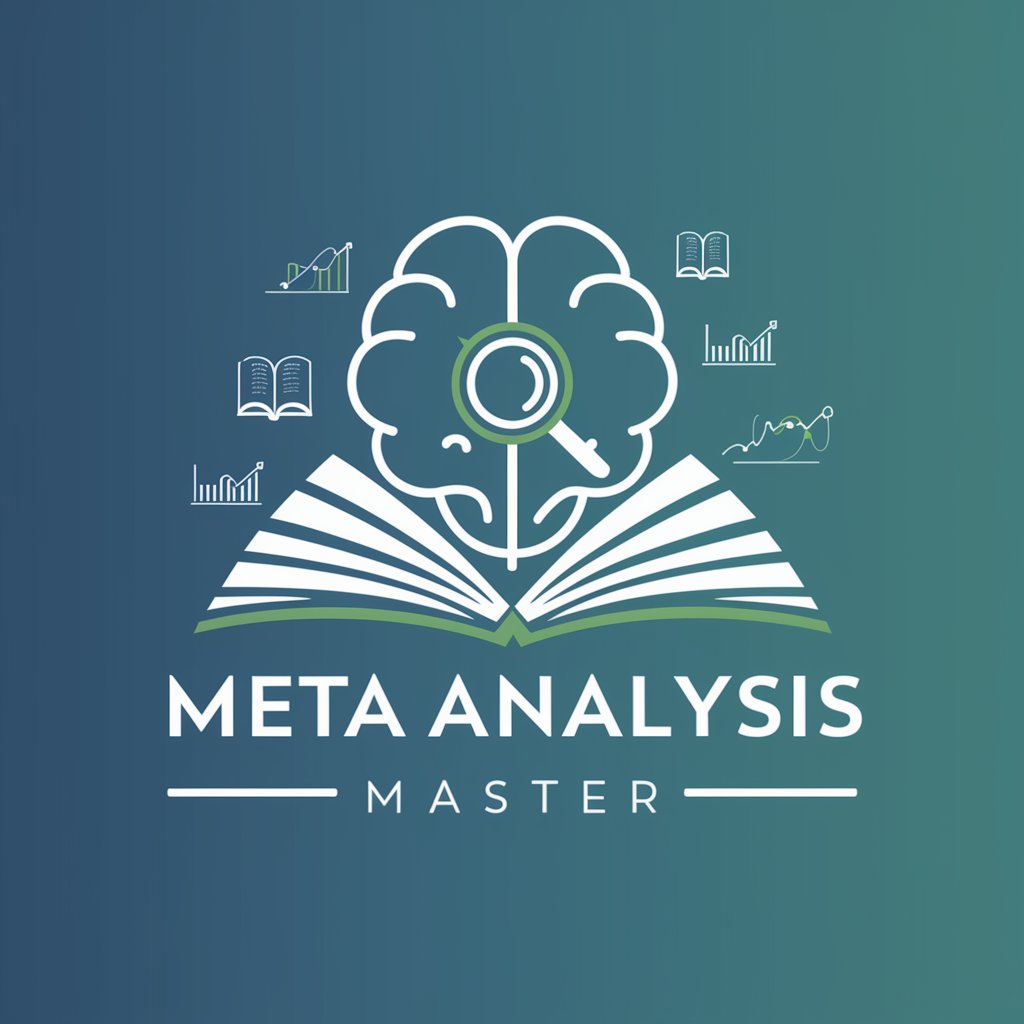Meta Analysis Master - Meta-Analysis Guidance

Welcome! Let's refine your meta-analysis together.
Empowering research with AI-driven analysis.
Can you help me formulate a research question for my meta-analysis on...
What are the best strategies for conducting a thorough literature search on...
How do I calculate effect sizes for my meta-analysis data on...
Could you explain how to assess heterogeneity in a systematic review?
Get Embed Code
Introduction to Meta Analysis Master
Meta Analysis Master is designed as an advanced support tool for researchers, scholars, and professionals engaged in the rigorous process of conducting meta-analyses and systematic reviews. Its primary function is to guide users through the intricate steps involved in compiling, analyzing, and interpreting data from multiple studies to draw comprehensive conclusions about a specific research question. Meta Analysis Master aids in formulating precise research questions, executing extensive literature searches, accurately coding studies for relevant data extraction, and performing detailed statistical analysis, including calculating effect sizes, assessing heterogeneity, and interpreting the results. For example, it can assist in developing a research question like 'What is the effect of mindfulness on reducing anxiety across randomized controlled trials?' and guide through the process of identifying relevant studies, extracting and pooling data, and conducting statistical analyses to answer the question. Powered by ChatGPT-4o。

Main Functions of Meta Analysis Master
Formulating Research Questions
Example
Assisting in refining a broad question like 'Does cognitive-behavioral therapy improve depression symptoms?' to a more specific and researchable question suitable for a meta-analysis.
Scenario
Used by a researcher at the outset of a systematic review to ensure the research question is precise and measurable.
Conducting Literature Searches
Example
Guiding users through databases and search strategies to find all relevant studies on the effect of a low-carb diet on type 2 diabetes control.
Scenario
Applied by a nutritionist conducting a meta-analysis to gather comprehensive evidence on dietary interventions.
Coding Studies and Data Extraction
Example
Providing templates and best practices for extracting and coding data from studies on the efficacy of teletherapy for mental health.
Scenario
Utilized by a team of psychologists to systematically review and synthesize outcomes of teletherapy across various studies.
Statistical Analysis and Interpretation
Example
Explaining how to calculate effect sizes, assess study heterogeneity, and interpret forest plots in a meta-analysis of the impact of urban green spaces on physical activity levels.
Scenario
Employed by public health researchers to quantify the effect of urban green spaces on physical activity and interpret the findings.
Ideal Users of Meta Analysis Master Services
Academic Researchers
Scholars and scientists across disciplines who are conducting meta-analyses as part of their research projects. They benefit from the tool's ability to streamline the research process, from question formulation to data analysis.
Graduate and PhD Students
Students working on their theses or dissertations that involve systematic reviews or meta-analyses. The tool provides step-by-step guidance, making complex processes accessible to those who may be new to this type of research.
Healthcare Professionals
Clinicians and healthcare policy makers interested in the latest evidence on treatments, interventions, and healthcare outcomes. They use the service to make informed decisions based on comprehensive analyses of existing studies.
Data Scientists in Public Health
Professionals who apply statistical methods to meta-analytic data for public health research and policy formulation. They benefit from the tool's advanced statistical analysis features to derive meaningful insights from complex data.

How to Use Meta Analysis Master
Start Your Journey
Initiate your meta-analysis research by visiting a designated platform offering a trial, ensuring accessibility without the necessity for advanced subscriptions or sign-ins.
Identify Your Research Question
Clarify and refine your research question or hypothesis to guide your systematic review or meta-analysis, focusing on specificity and relevance to your field.
Conduct a Literature Search
Utilize comprehensive search strategies across multiple databases to gather relevant studies, employing both keywords and subject headings tailored to your research question.
Code and Analyze Data
Carefully extract and code data from selected studies, then apply appropriate statistical methods to calculate effect sizes, assess heterogeneity, and interpret results.
Refine and Report
Iteratively refine your analysis based on findings, and prepare a detailed report or publication, adhering to PRISMA guidelines and standards for meta-analysis.
Try other advanced and practical GPTs
Meta Ads Analyser
Elevate Your Ads with AI-Powered Insights

Meta Muse
Crafting Click-Worthy Meta Descriptions, AI-Powered

Meta Creator
Crafting precise metadata for AI-powered images.

IELTS ✅
AI-powered IELTS Writing Assistant

IELTS SpeakMaster
AI-powered speaking coach for IELTS success

IELTS Mentor- IELTS Master Engonow
AI-powered, personalized IELTS preparation

Article Generator
Empowering your words with AI

Article Insight
Empowering your writing with AI-driven insights.

Article Assistant
Empowering Health Narratives with AI

Article Search
Empowering research with AI-driven insights

Outrank Article
Elevate Your Content, Outrank the Competition

Article Analyst
Insightful Analysis, AI-Powered Precision

FAQs about Meta Analysis Master
What is Meta Analysis Master?
Meta Analysis Master is an AI-powered tool designed to assist researchers in conducting meta-analyses and systematic reviews, offering guidance through each step of the process from formulating research questions to data analysis and interpretation.
How does Meta Analysis Master assist in literature search?
It provides strategies for comprehensive literature searches, suggesting relevant databases, keywords, and subject headings, and offers tips for managing search results effectively.
Can Meta Analysis Master help with data extraction?
Yes, it offers guidance on accurately extracting and coding data from studies, and advises on the use of software tools for data management and analysis.
What statistical methods does Meta Analysis Master cover?
It covers a range of statistical methods including effect size calculation, heterogeneity assessment, and meta-regression, providing explanations suitable for various expertise levels.
Is Meta Analysis Master suitable for beginners?
Absolutely, it is designed to cater to users of all expertise levels, offering step-by-step guidance, explanatory content, and tips to navigate the complexities of meta-analysis and systematic reviews.
